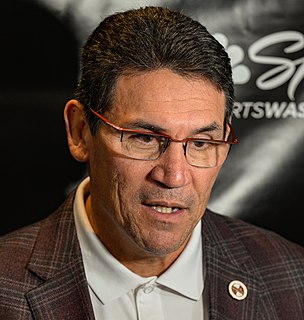A Quote by Soledad O'Brien
It is truly not fun to be the family that sticks out in an all-white community. On the other side, I have five brothers and sisters; we all look exactly the same, and we're very, very tight. The lessons about race were not pleasant, but there are things that I loved about my childhood.
Related Quotes
I have no memories of my childhood in Texas. When I was about four, we moved to San Francisco. I was in the middle of seven brothers and sisters: three girls and four boys. Most of my older brothers and sisters got the blame for everything, and the little ones had a free ride. We loved each other but fought like cats and dogs.
I don't want our white working class sisters and brothers to feel as though their pain is not important because it is. But at the same time, I want my white sisters and brothers to understand that when we talk about income and wealth inequality, that disproportionately African Americans suffer a little more.
I had lost my sister recently, too, which meant that my whole family was gone. I was the baby of the family. There were five Sendaks and there were five Wild Things, and now there's only one Sendak, and he's about to bite the dust, too! Life, as I said before, was very difficult at that time and so it was natural that there would be a change in the look of things. Also, I was very impressed with my own strength in doing this under the circumstances in which I was living.
From very early on in my childhood - four, five years old - I felt alien to the human race. I felt very comfortable with thinking I was from another planet, because I felt disconnected - I was very tall and skinny, and I didn't look like anybody else, I didn't even look like any member of my family.
My mom was very spiritual. We were a Catholic family. We read the Bible at a young age. I have two brothers and a sister. We're all very close. That was part of our childhood. But when I went to college and then got drafted and played in Anaheim, it was a life changer for me. I was exposed to so many things. I was out on my own for the first time.
I'm one of five sisters. I'm the younger of twins, and we're the youngest of five girls, and we've always been very close. We were pretty much a gang. I take after my mother a lot in terms of personality and character. She was very positive; always looked on the bright side of things. She had a tough time of it with my dad but did her best.
After Mickey passed, I was talking to my mom on the phone. She was talking about how we were such good brothers and we were so close. And I said, 'Mom, think about how we were raised. We were a military family. And in a military family, because you move around so much, your best friends and your first teammates are your brothers or your sisters.'
Sisters, while they are growing up, tend to be very rivalrous and as young mothers they are given to continual rivalrous comparisons of their several children. But once the children grow older, sisters draw closer together and often, in old age, they become each other's chosen and most happy companions. In addition to their shared memories of childhood and of their relationship to each other's children, they share memories of the same home, the same homemaking style, and the same small prejudices about housekeeping that carry the echoes of their mother's voice.
I was the fifth child in a family of six, five boys and one girl. Bless that poor girl. We were very poor; it was the 30s. We survived off of the food and the little work that my father could get working on the roads or whatever the WPA provided. We were always in line to get food. The survival of our family really depended on the survival of the other black families in that community. We had that village aspect about us, that African sense about us. We always shared what we had with each other. We were able to make it because there was really a total family, a village.
My parents deeply and truly loved each other, and if my mother hadn't died they would have been together forever. They were together for as much of forever as was given to them. They really loved my brother and me and were very good to us. It gave the model of how to have a happy marriage and family, but it also set the bar very high.

































